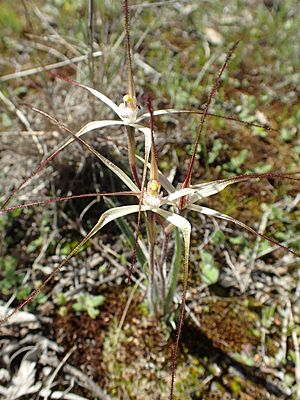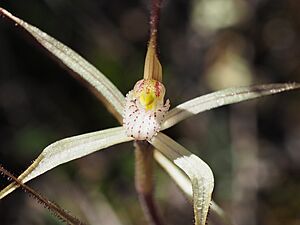Ironcaps spider orchid facts for kids
Quick facts for kids Ironcaps spider orchid |
|
|---|---|
 |
|
| Caladenia paradoxa growing in the Lake Hurlstone Nature Reserve | |
| Scientific classification | |
| Genus: |
Caladenia
|
| Species: |
paradoxa
|
| Synonyms | |
|
|
The Ironcaps spider orchid (scientific name: Caladenia paradoxa) is a special type of orchid that only grows in the south-west part of Western Australia. It has a single, fuzzy leaf that stands up straight. Its flowers are small and creamy-white, and there can be up to three of them.
Scientists used to think this orchid was the same as another one found in eastern Australia, called Caladenia flaccida. However, they now know that the Ironcaps spider orchid is its own unique species.
Contents
What the Ironcaps Spider Orchid Looks Like
The Ironcaps spider orchid is a plant that grows from the ground. It is a perennial plant, meaning it lives for more than two years. It's also deciduous, which means it sheds its leaves at certain times. This plant has an underground tuber, which is like a small storage organ.
It grows a single, hairy leaf that stands up. This leaf is usually about 5 to 10 centimetres (2 to 4 inches) long and 2 to 4 millimetres (0.08 to 0.16 inches) wide.
The orchid can have up to three creamy-white flowers. These flowers are quite large, measuring about 8 to 15 centimetres (3 to 6 inches) long and 6 to 10 centimetres (2 to 4 inches) wide. They grow on a stem that is 15 to 30 centimetres (6 to 12 inches) tall.
The parts of the flower that look like petals and sepals have long, thin, brown ends that hang down. The top sepal stands straight up and is about 5 to 10 centimetres (2 to 4 inches) long. The side sepals are also 5 to 10 centimetres long and curve downwards. The petals are similar, about 5 to 9.5 centimetres long, and also curve downwards.
The most interesting part is the labellum, which is a special lip-like petal. It is about 8 to 12 millimetres (0.3 to 0.5 inches) long and 5 to 7 millimetres (0.2 to 0.3 inches) wide. It is creamy-white with red lines and spots. The sides of the labellum have small, blunt teeth. There are also two rows of cream-coloured bumps, called calli, along the middle. These calli sometimes have red tips.
This orchid usually blooms from August to early October.
How it Was Named
The Ironcaps spider orchid, Caladenia paradoxa, was first officially described in 2001. Two scientists, Stephen Hopper and Andrew Phillip Brown, found a specimen near Southern Cross. They published their description in a science journal called Nuytsia.
The second part of its scientific name, paradoxa, comes from a Latin word. It means "strange" or "contrary to expectations." This name was chosen because it was difficult for scientists to decide if this orchid was truly a separate species from others.
Where it Lives
The Ironcaps spider orchid is found in the coastal plains of Western Australia. It grows in an area between Wubin and Norseman.
It prefers to grow on the slopes of hills that are made of ironstone. These are special types of rocks that contain a lot of iron.
Conservation Status
The Western Australian Government's Department of Parks and Wildlife has classified Caladenia paradoxa as "not threatened." This means that, for now, there are enough of these orchids in the wild, and they are not considered to be in danger of disappearing.


